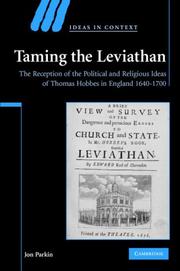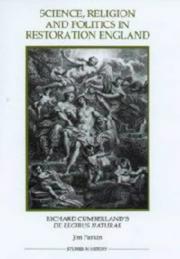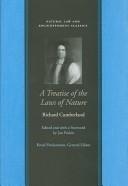| Listing 1 - 5 of 5 |
Sort by
|

ISBN: 9780511720499 9780521877350 9780521168311 9781107322141 1107322146 0511720491 9781107316751 1107316758 9781139810739 1139810731 0521168317 0521877350 1107317711 9781107317710 1107318645 9781107318649 1299399827 9781299399822 1107315794 9781107315792 110719881X 9781107198814 Year: 2007 Publisher: Cambridge, UK New York Cambridge University Press
Abstract | Keywords | Export | Availability | Bookmark
 Loading...
Loading...Choose an application
- Reference Manager
- EndNote
- RefWorks (Direct export to RefWorks)
Thomas Hobbes is widely acknowledged as the most important political philosopher to have written in English. Originally published in 2007, Taming the Leviathan is a wide-ranging study of the English reception of Hobbes's ideas. In the first book-length treatment of the topic for over forty years, Jon Parkin follows the fate of Hobbes's texts (particularly Leviathan) and the development of his controversial reputation during the seventeenth century, revealing the stakes in the critical discussion of the philosopher and his ideas. Revising the traditional view that Hobbes was simply rejected by his contemporaries, Parkin demonstrates that Hobbes's work was too useful for them to ignore, but too radical to leave unchallenged. His texts therefore had to be controlled, their lessons absorbed and their author discredited. In other words the Leviathan had to be tamed. Taming the Leviathan significantly revised our understanding of the role of Hobbes and Hobbism in seventeenth-century England.
Political philosophy. Social philosophy --- Hobbes, Thomas --- Christianity and politics --- Political science --- Christianity --- Church and politics --- Politics and Christianity --- Politics and the church --- History --- Political aspects --- Great Britain --- Politics and government --- Hobbes, Thomas, --- Gobbs, Tomas, --- Hobbs, Thomas, --- Gobbes, Tomas, --- T. H. --- H., T. --- Hobs, Thomas, --- Hobbes, --- Hobbes, Thom. --- Hobbius, Thomas, --- Hobbuzu, Tomasu, --- Huobusi, --- Hobbs, Tho. --- הובס, תומס, --- 霍布斯, --- ホッブズ, トマス, --- Social Sciences --- Political Science

ISBN: 9780511720499 9780521877350 Year: 2010 Publisher: Cambridge Cambridge University Press
Abstract | Keywords | Export | Availability | Bookmark
 Loading...
Loading...Choose an application
- Reference Manager
- EndNote
- RefWorks (Direct export to RefWorks)

ISBN: 0861932412 Year: 1999 Publisher: Rochester, NY Woodbridge, Suffolk The Royal Historical Society : published by the Boydell Press
Abstract | Keywords | Export | Availability | Bookmark
 Loading...
Loading...Choose an application
- Reference Manager
- EndNote
- RefWorks (Direct export to RefWorks)
Book
ISBN: 9780197265406 0197265405 Year: 2013 Volume: 186 Publisher: Oxford Oxford university press
Abstract | Keywords | Export | Availability | Bookmark
 Loading...
Loading...Choose an application
- Reference Manager
- EndNote
- RefWorks (Direct export to RefWorks)
The early enlightenment has been seen as an epoch-making period in the development of modern Europe, marking the beginnings of the transition from a 'religious' to an essentially 'secular' understanding of human relations and generating in the process new accounts of the relationship between religion and politics, in which the idea of toleration figured centrally. In this volume of essays, leading scholars in the field challenge that view and explore the ways in which some of the most important discussions of toleration in the western tradition were shaped by understandings of natural theology and natural law. Far from representing a shift to non-religious ways of thinking about the world, the essays reveal the extent to which early enlightenment discussions of toleration presupposed a world-view in which God-given natural law established the boundaries between church and state and provided the primary point of reference for understanding claims to religious freedom.
Tolérance --- Liberté religieuse --- Christianisme --- Natural law --- History of philosophy --- anno 1600-1699 --- Toleration --- Religious tolerance --- Religion and state --- Freedom of religion --- Enlightenment --- Natural theology --- History --- Christianity --- Congresses --- Christianisme. --- Toleration - Europe - History - 18th century - Congresses --- Religious tolerance - Christianity - History - 17th century - Congresses --- Religious tolerance - Christianity - History - 18th century - Congresses --- Religion and state - Europe - History - 18th century - Congresses --- Religion and state - Europe - History - 17th century - Congresses --- Freedom of religion - Europe - History - Congresses --- Natural law - History - Congresses --- Enlightenment - Congresses --- Natural theology - Congresses

ISBN: 1614877912 9781614877912 9780865974722 0865974721 0865974721 086597473X 9780865974739 Year: 2005 Publisher: Indianapolis, Ind. Liberty Fund
Abstract | Keywords | Export | Availability | Bookmark
 Loading...
Loading...Choose an application
- Reference Manager
- EndNote
- RefWorks (Direct export to RefWorks)
Christian ethics. --- Ethics. --- Ethical theology --- Moral theology --- Theology, Ethical --- Theology, Moral --- Christian life --- Christian philosophy --- Religious ethics --- Deontology --- Ethics, Primitive --- Ethology --- Moral philosophy --- Morality --- Morals --- Philosophy, Moral --- Science, Moral --- Philosophy --- Values
| Listing 1 - 5 of 5 |
Sort by
|

 Search
Search Feedback
Feedback About UniCat
About UniCat  Help
Help News
News